Expert Guide to Touring in Mainland Europe
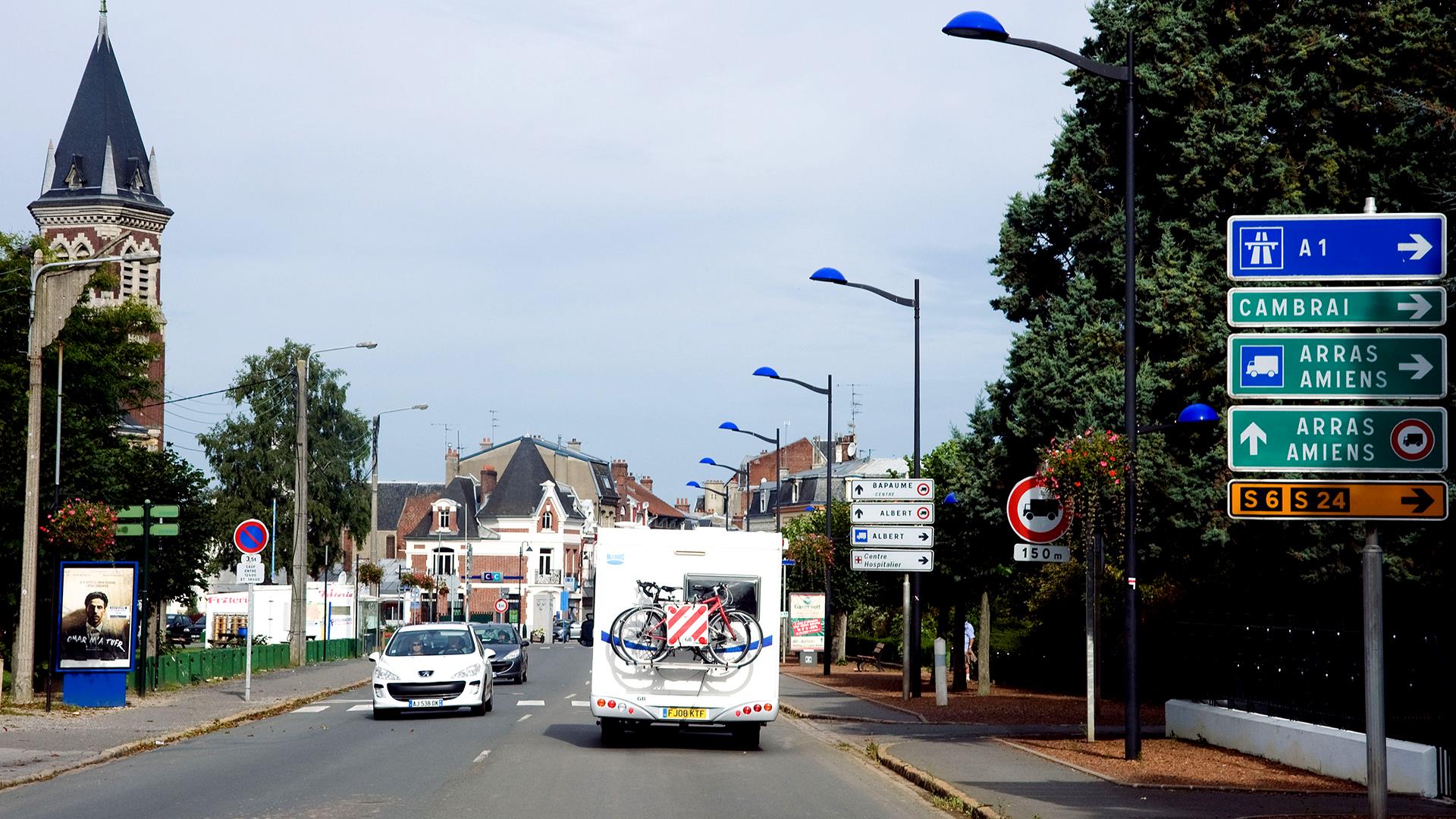
Travelling in and around mainland Europe can be an exciting and enjoyable experience but quite different to touring in the UK. With a variety of laws, regulations, camping rules and other factors to consider, it’s important to be prepared and this Expert Guide provides a great starting point.
Please read this guide in conjunction with our Expert Guide: Rules of the Road when travelling in Europe, which covers many of the local rules to consider when driving on the continent.
Please note that the information contained here primarily applies to our key destination markets of France, Spain and Portugal, and is subject to change, so it’s always worth doing your own research for specific countries and circumstances before you travel.
The basics
Check that your vehicle and personal documentation are up-to-date before you travel, and ensure that all members of your party meet the border entry requirements for all countries on your itinerary. Always carry your driving licence, the original vehicle registration document (or Vehicle on Hire Certificate), certificate of insurance and your passport. Carrying photographic proof of identity (your passport is best for this) is now compulsory in some countries as well as good practice.
TOP TIP: Take photocopies, photographs or scans of all your holiday documents, including passport, driving licence, EHIC, GHIC, CCI, insurance and vehicle paperwork, plus the generic names or packaging of any medicines you take. Keep all your documents safe – and keep the copies in a different place to the originals. It’s also a good idea to save photographs or scans of your documents in your phone, online in a secure cloud service or attached to an email.
Passports
Passports are required for adults and children and must be valid for at least six months after the first day of travel. They must also be less than ten years old, even if they have six months or more until expiry. We strongly advise you to visit the official Government travel advice webpage for the country you are visiting to check the current requirements.
EU Entry & Exit System
Anyone who is not an EU or European Economic Area citizen (for example UK citizens) will need to be registered on the Entry & Exit System (EES). This is designed to reduce wait times at border control as well as count the 90 days within the 180 days allowance you are able to stay in the Schengen Area. It is similar to the biometric scanners that are already in use at some airports and should eventually reduce the need to stamp a passport. The system is planned to become operational in late 2025. It will require all passengers to pre-register and provide biometric information at an EES kiosk as part of the first border crossing after implementation. This is likely to cause delays at the port. Subsequent crossing will still require scanning at a kiosk but should be quicker. More details can be found here.
Visas and the ETIAS scheme
British citizens do not need a visa for visits of 90 days or less within a 180-day period to countries in the Schengen Area. This zone encompasses the majority of EU countries and allows citizens of member countries to move around freely without restriction or border control, in a passport-free environment.
If you wish to stay longer than 90 days you will have to apply for a visa to the relevant embassies or consulates in each country you travel through, and additional fees apply. There are links from the UK Government Foreign Travel pages.
A visa waiver scheme, valid for travel in all 27 countries of the Schengen Area, is being introduced by the European Travel Information and Authorisation System (ETIAS) to boost security across the EU and is expected to come into effect around a year after EES. For more details visit the official EU ETIAS website at https://travel-europe.europa.eu/etias_en
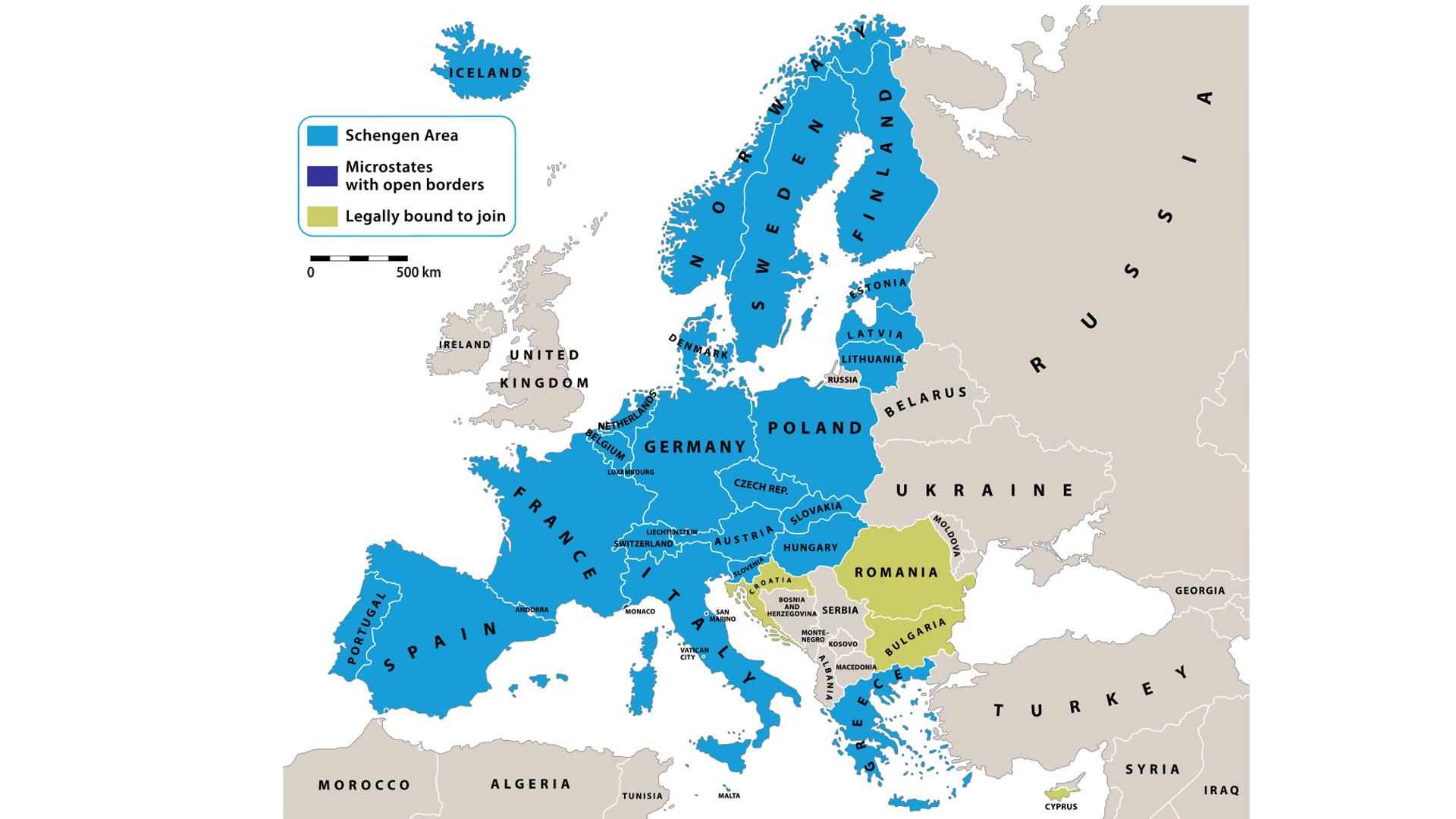
The Schengen area covers 27 European countries
At the port/border crossing
General regulations and documentation
No temporary importation documents are required for caravans, campervans or trailers, but the vehicle must be fully legal in the UK (tax, insurance and MOT) and we recommend you take original documents including the vehicle’s V5C and copies for inspection by the authorities. The vehicle may remain in most countries for a maximum of six months – beyond that it must be exported, or the owner must carry out the formalities for permanent importation. The exceptions are in Ireland, Italy and Sweden where caravans can be stored for up to 12 months. Click here for more information.
Temporary importation rules can apply to other items from third party countries (which now include the UK) when travelling to the EU. Most countries suggest the user creates an inventory of items being carried in the car, caravan or motorhome, especially if they are expensive or unusual. Examples include items such as portable and electronic equipment, and electric bikes, especially if carried externally. The list can be shared with border authorities if required to help avoid delays.
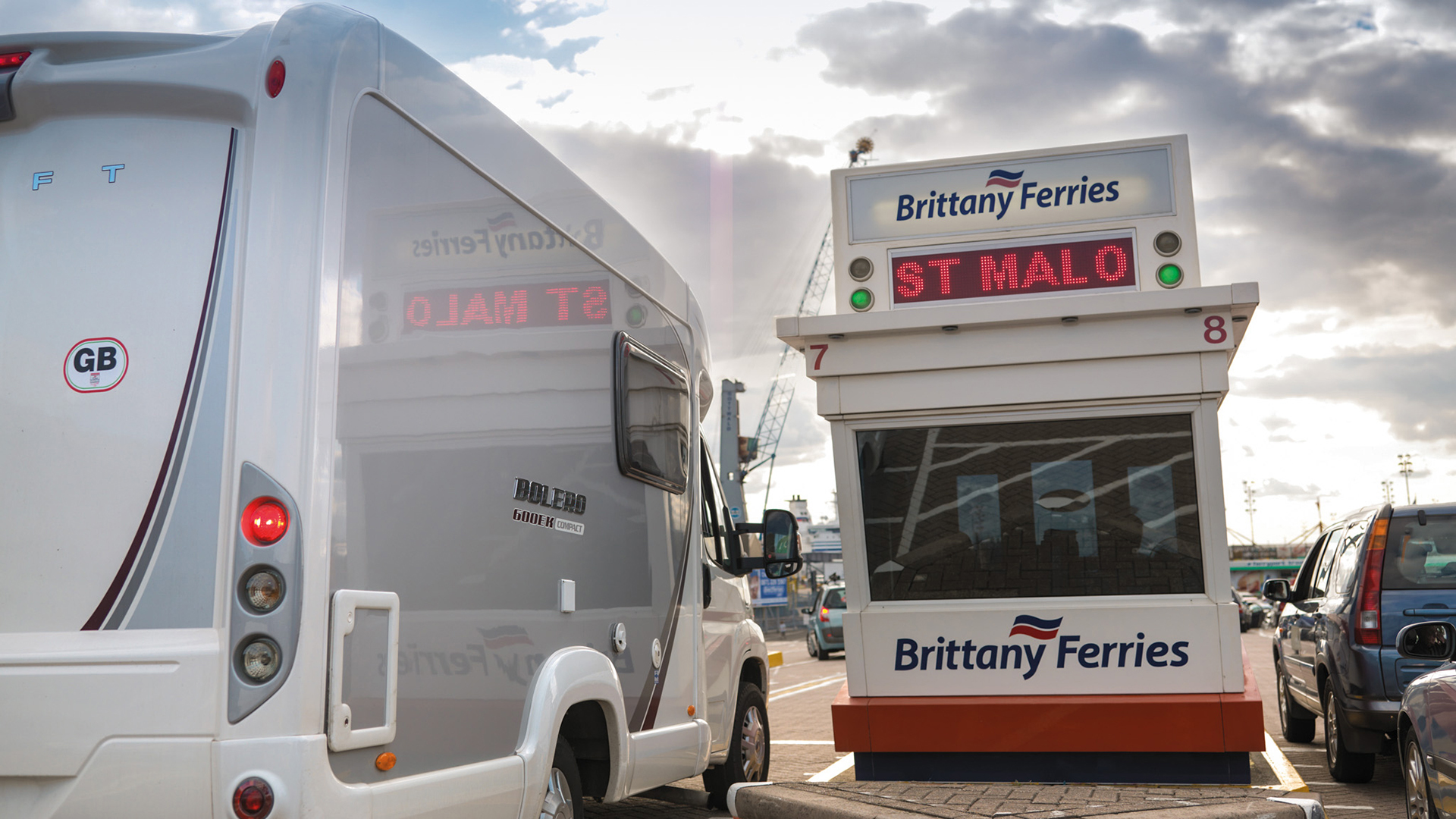
Plan ahead to avoid delays at border control crossing points
Crossing checklist
Prior to your departure it’s advisable to check the Government website for any specific health recommendations for visitors. Take photocopies or store information on your mobile phone of all important documents.
You will need to carry all the following and may need to show some or all at border control:
• Return or onward tickets
• Proof of sufficient funds for your stay – such as a bank statement or cash
• Display a country identifier sticker – our Expert Guide: Rules of the Road when travelling in Europe
• Proof of ownership and insurance documents
• Environmental badges and stickers
Travel to the Republic of Ireland
There are certain exceptions to the above when travelling between the UK and Ireland. For example, you will not need a UK sticker and normal passport validity applies – make sure you check the requirements before travel.
Taking food and drink into the EU
The rules for non-EU citizens state that many food items (meat, milk, plant, fruit and vegetables or products containing them) are not permitted to enter EU countries. Certain fish products are allowed and so are bananas, coconuts, dates and pineapples. There are exceptions for certain amounts of powdered infant milk, infant food or pet food required for medical reasons. If you do take restricted items into the EU there is a risk they will be confiscated at the border and could be subject to a fine. Check these rules on the European Commission website and here for plant and plant products.
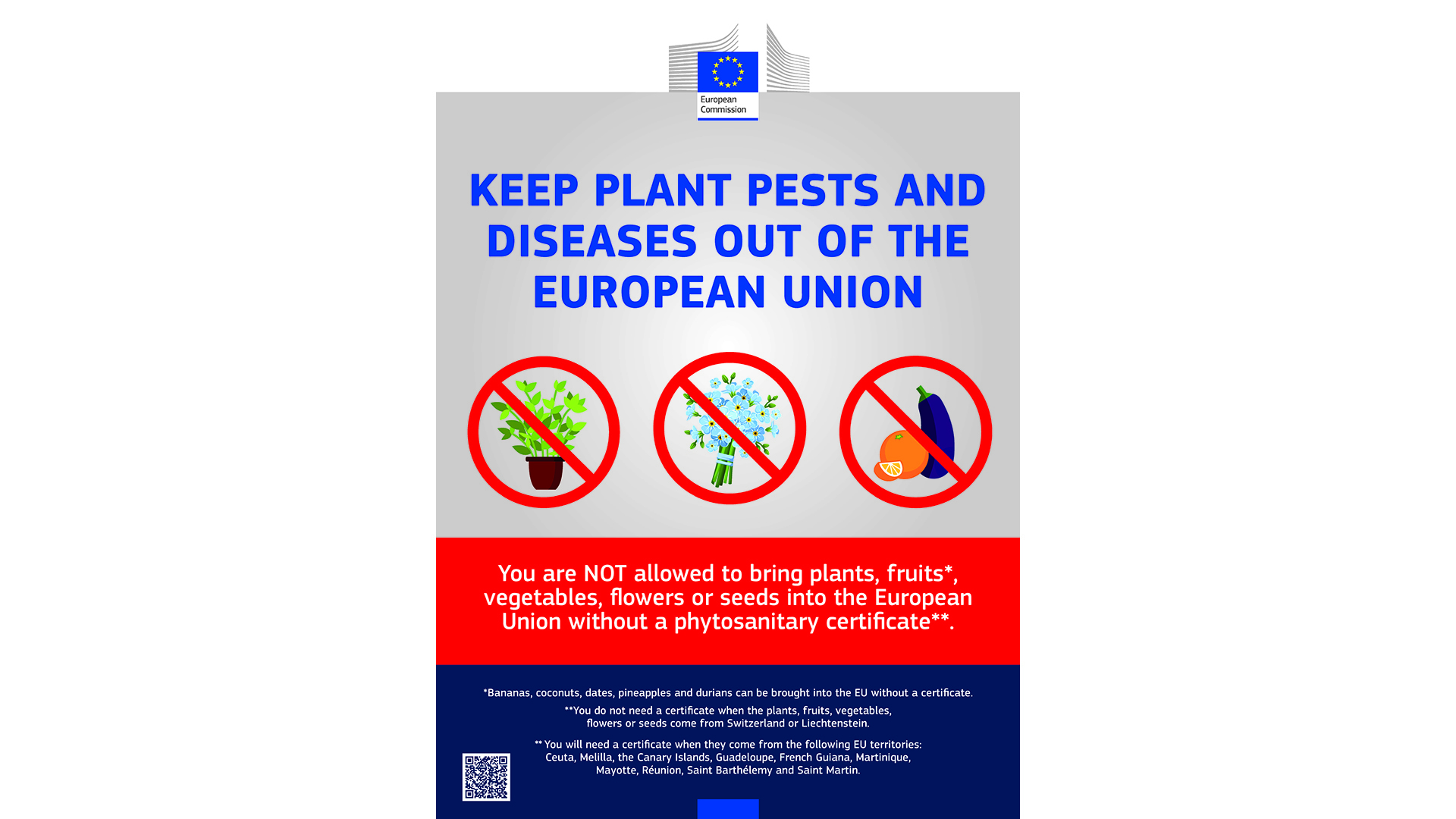
There are strict rules on carrying certain foods and plants
Travel and health insurance
If you have an existing European Health Insurance Card (EHIC), this covers most travel in the EU, Iceland, Liechtenstein, Norway or Switzerland. It remains valid until its expiry date.
The UK Global Health Insurance Card (GHIC) has now replaced the EHIC for new applications and covers medically necessary state healthcare in the same countries as the EHIC. The GHIC is free and can be obtained online on the NHS website.
General healthcare advice from the UK Government is available here.
It’s important to note that health insurance cards do not replace quality travel insurance. We recommend you take out adequate cover for your travel and health needs, including any pre-existing medical conditions any of your party may have.
Travel insurance is especially important because the reciprocal agreements of the EHIC and GHIC cards may not cover all potential expenses, which can range from ambulances or dental treatment to air ambulance fees or repatriation to the UK, in the event of serious illness or death.
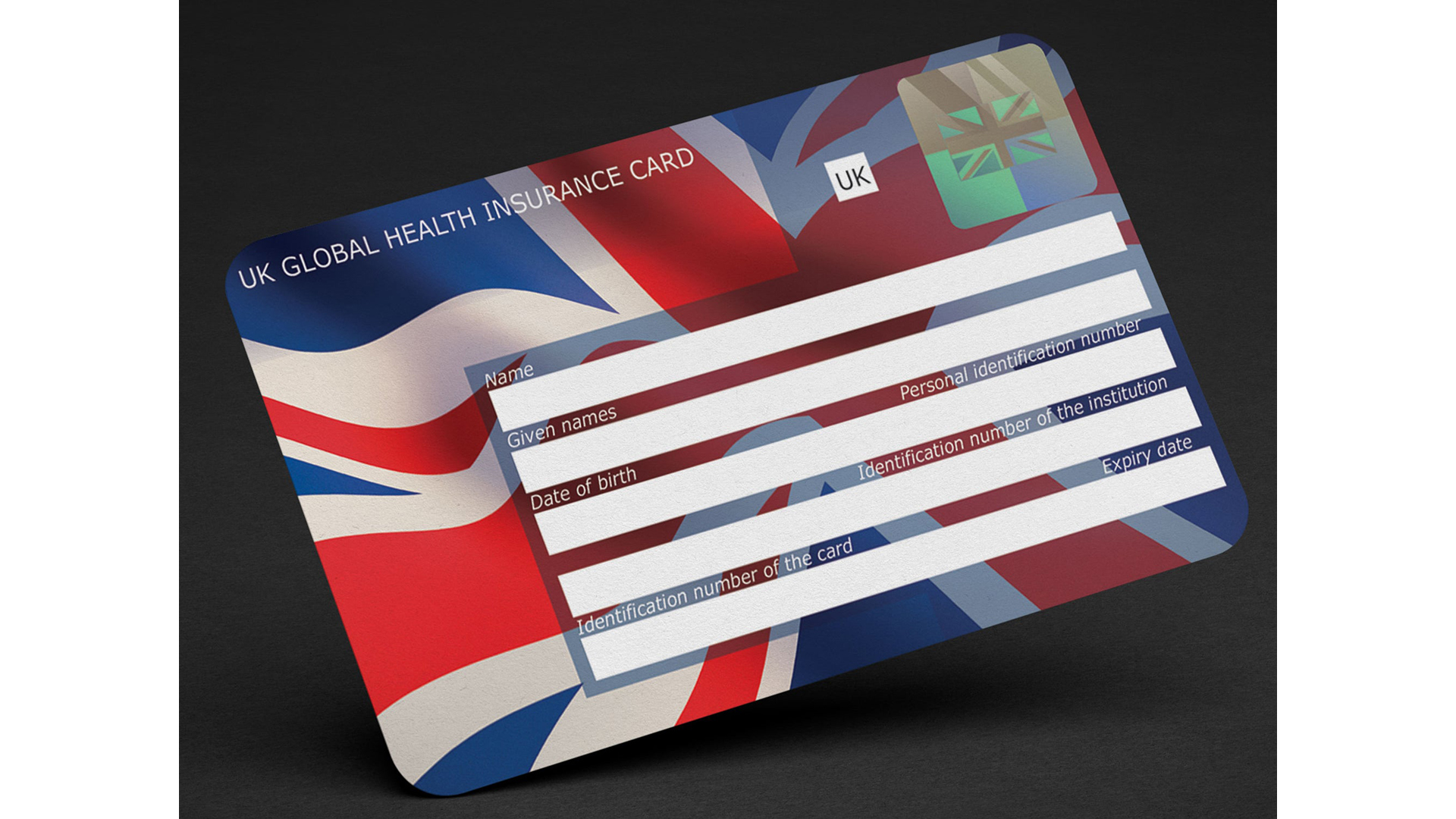
A GHIC card will help with medically necessary state healthcare but is unlikely to cover all potential expenses
In the case of an accident, EHIC and GHIC cards can make access to healthcare go more smoothly. They can also help with theft, cancellation and translation services, and may protect you if your package holiday provider goes bust, as long as the holiday was sold in the UK. If you need to claim for patient contributions (co-payments) that you make for treatment you receive abroad, this is done when you return to the UK. More information is available on the NHS GHIC website.
Remember that private hospitals will not accept the GHIC and will ask you to pay for your treatment or to provide evidence of adequate insurance.
For more information visit the Government website.
*It’s also worth noting that anyone living outside the UK for more than three months is no longer automatically entitled to free NHS treatment in the UK. Decisions on entitlement are made by your local NHS trust, so contact them for further information before travel.
Camping Card International (CCI)
Also known as CCI or Carnet, this identity card confirms that the holder, as a Club member, is insured against third party claims arising from any accident at any campsite in the world, while engaged in the recognised activity of the Club. The cards are issued by the Federation Internationale de Camping, Caravanning et Autocaravaning (FICC), the international umbrella organisation of major camping clubs throughout the world, and all members attending Club rallies abroad must have one. Club members can buy CCI online for £7.50.
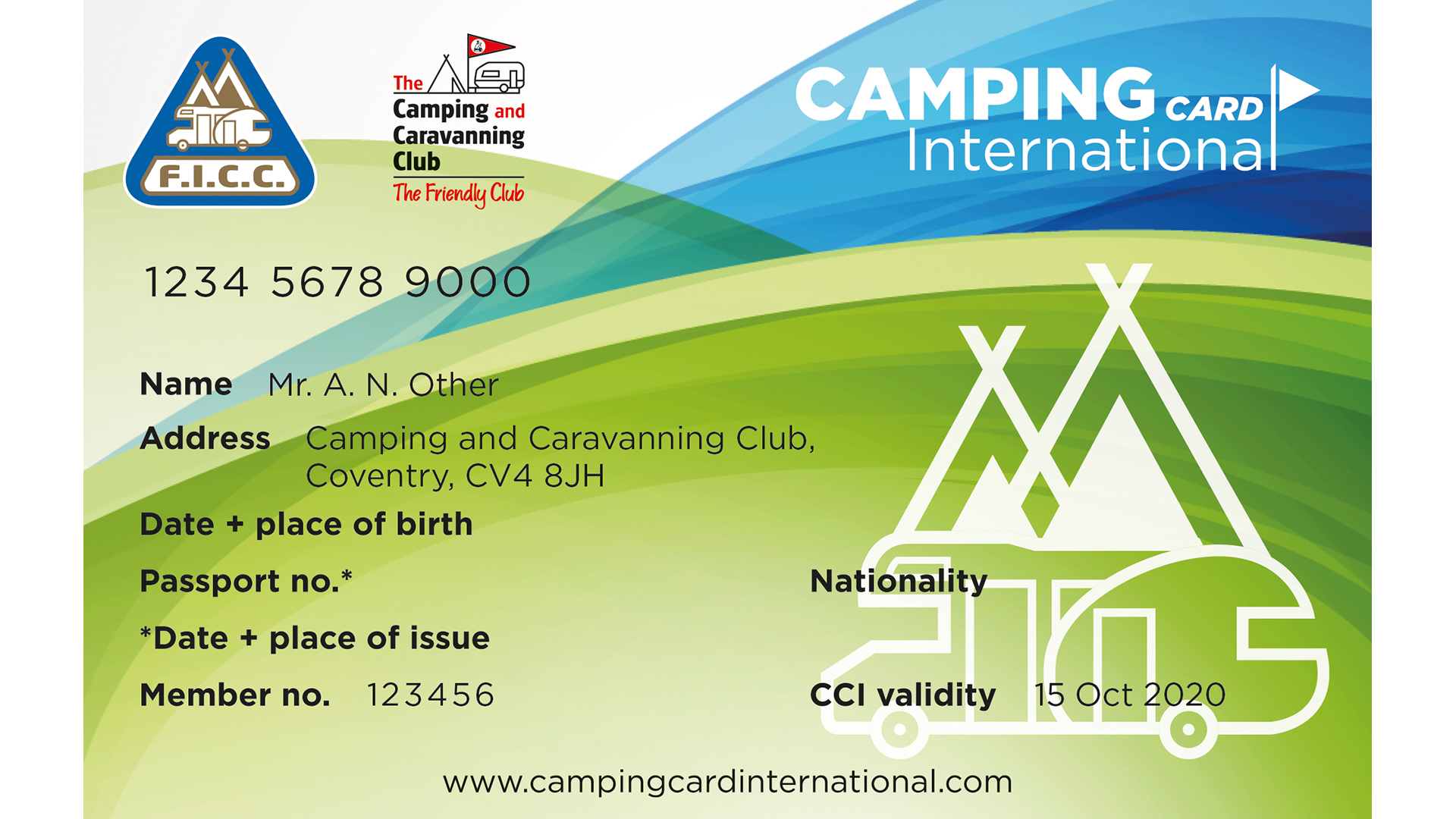
Carrying a CCI card means you are insured against third party claims arising from any accident at any campsite in the world
Onward travel in Europe
Route planning
Part of the enjoyment of any holiday is the preparation, and planning your journey will also help make things go more smoothly. Take time to consider your route so that the travel becomes as exciting as the destination. Maps and atlases can be obtained from michelin.co.uk. There are also several well-known route-finding websites online – try googlemaps.com, en.mappy.com, or viamichelin.com. If you need a rough idea of fuel prices for travel planning, there are a variety of websites to help with this, including racfoundation.org/data. Please also check out our satellite navigation advice.
It’s worth pre-booking campsites that are near to your planned route of travel in the UK, France, Spain and Portugal – this offers peace of mind in case you encounter any delays.
For UK Club Sites, visit the Club’s SiteSeeker pages, download the Siteseeker app or use the SiteSeeker handbook. Refer to our European travel partners or consider an ACSI card from the Club for discounts on campsites in low season.
General driving advice
Apart from key differences such as driving on the right and road signs indicating speed limits in kilometres per hour (kph), driving on the continent is much like driving in the UK. You’ll find motorways and roads largely less congested on the continent (apart from around major cities), though you are likely to be driving longer distances than you may be used to in the UK. Speed limits can vary widely by country, size of vehicle, and whether you’re towing or not, so check out our Expert Guide: Rules of the Road when travelling in Europe,
There are lots of tips when driving on the continent, not least to stay alert when exiting service stations and similar, especially when joining single carriageway roads. It’s a good idea to keep a note on the dashboard or sun visor to remind you to keep right, as well as details of local speed limits and the height/weight of your vehicle. Avoid tiredness by not driving for long distances without taking a break – we’d suggest doing so every couple of hours.
You should also avoid drinking and driving as the laws in many European countries are far stricter than the UK, and be sure to follow the laws and rules of the road of the country you are driving in.
There is also lots of good up-to-date information about driving in mainland Europe provided by the RAC here, including general rules and speed limits for solo cars and campervans weighing up to 3,500kg.
En route stops
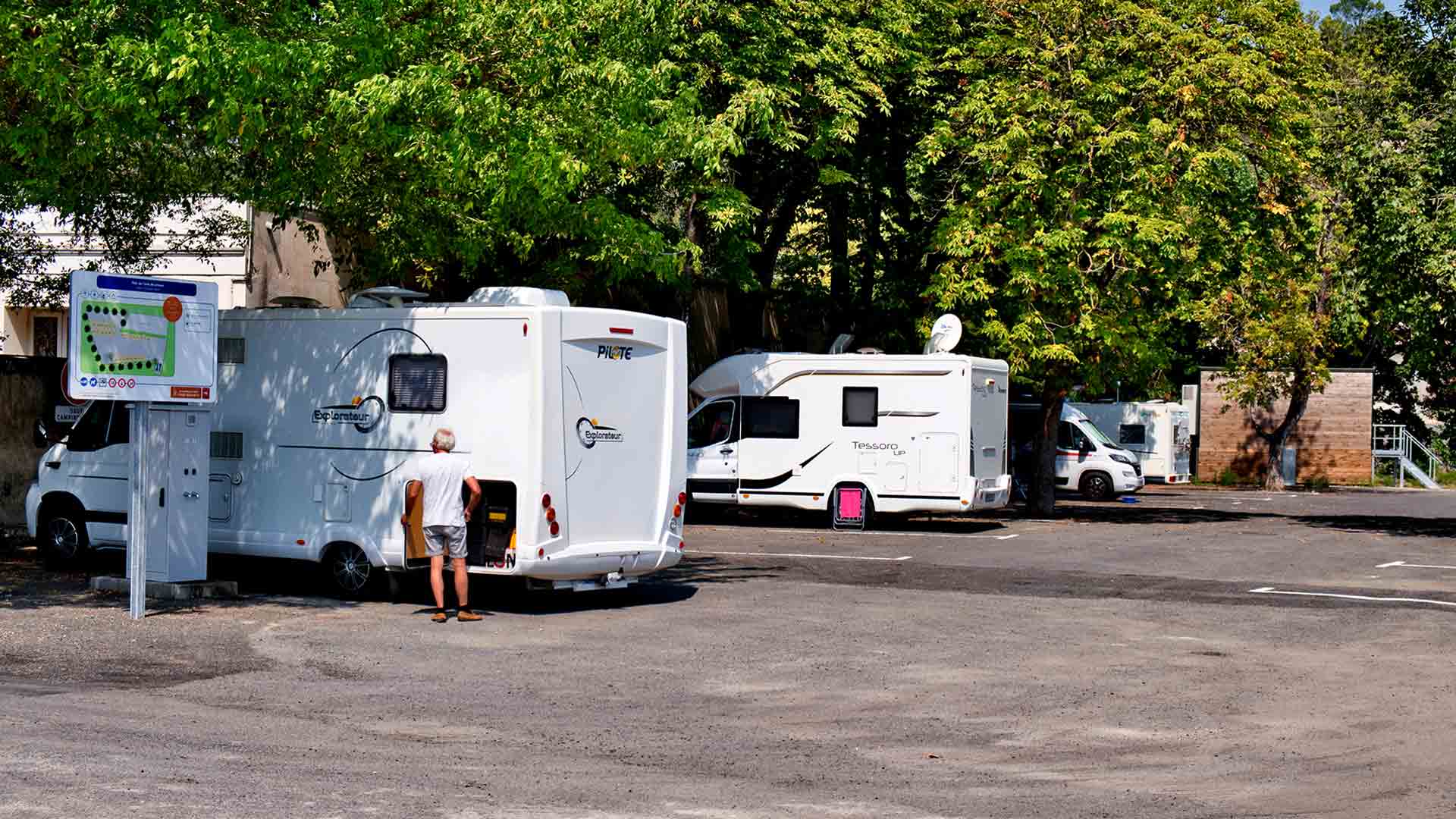
A service area is a useful place to take a break while travelling, but cannot be used for overnight stops
Stopping is allowed for a few hours at motorway service areas but be aware that toll tickets are valid for a limited time period. In France it is forbidden to spend the night in a caravan at the roadside. The Club does not recommend service areas or lay-bys abroad, whether on motorways or on other roads, as safe places to spend the night. Choose a bona fide campsite instead.
Safety and Security
We recommend checking the Foreign, Commonwealth and Development Office (FCDO) travel advice for the countries you are visiting before you book and again before you travel. Most visits to the continent make for enjoyable and trouble-free holidays, but there are a few things you should be aware of.
For example, the FCDO offers the following advice for touring in Spain:
“Be aware of ‘highway pirates’ who target foreign-registered and hire cars, especially those towing caravans.”
General advice for keeping safe while touring
You should always be mindful of your safety, especially when on holiday in a foreign environment. This will mainly involve the same basic safety precautions you’d take when travelling at home, though our members have reported a number of experiences as well as advice on how best to overcome them, that are worth bearing in mind.
• If a stranger tries to point out a problem or tell you to stop but your vehicle is behaving normally it’s advisable to carry on driving, at least until the next public rest area
• Do not leave the keys in the ignition, and keep your doors locked and windows closed at all times, even if a member of your party remains inside the vehicle
• Guard your valuables, especially at markets and motorway services
• Do not keep all your valuables, documents and money in one place
• Have a camera or phone within reach so you can record or report any incident
Camping in Europe
Continental campsites that partner with the Club are not Club Sites, so do not expect similar facilities, pitch sizes or rules. It’s worth noting the following:
• There is no specific six-metre rule to act as a fire break – some pitches may be as little as one metre apart
• Pitch sizes vary a lot, so confirm they will be large enough for your needs
• Campsite rules may be different to those you are used to, so make sure to read them
• Water supplied may not be drinkable
• Electrical supplies tend to have lower capacity and many are metered
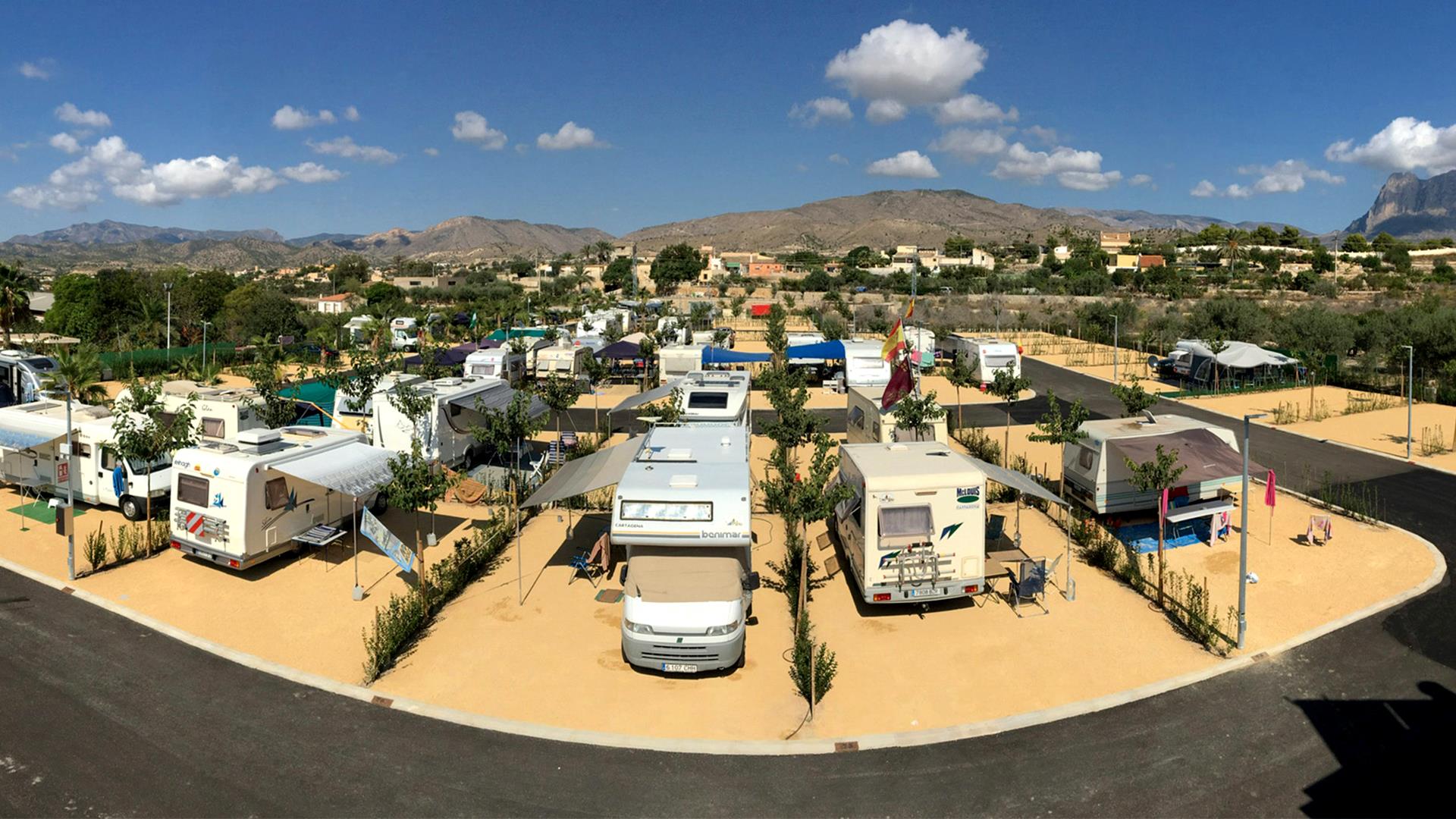
Pitch sizes and spacing are likely to be different to what you would expect on a Club Site
Caterpillars
You might see processionary caterpillars, especially around oak or pine trees, particularly between February and April but possibly at other times. Generally, any kind of caterpillar should not be touched, as contact with some species can cause serious irritation and discomfort. In extreme cases they may cause problems with breathing and can prove fatal to pets. Campsites organise preventative treatment where necessary, but a total absence cannot be guaranteed on or off site. If you see caterpillars on site, report it to reception immediately.

Ensure you never touch caterpillars and report any you see to the campsite reception
Pets
Animal travel requirements
Pet passports are no longer valid for travel to the EU, so if you wish to take your pet you will need to get an Animal Health Certificate (AHC) from an official veterinarian. This document confirms that your pet is microchipped and vaccinated against rabies. It’s worth noting it can take at least a month from the first vet’s visit before your pet is able to obtain an AHC.
The AHC must be issued within ten days of leaving the UK and is valid for four months, but only for one trip. A new AHC is required each time you leave the UK.
Legal restrictions apply to the AHC scheme and documentary evidence of vaccination and veterinary inspections are required.
Only certain approved routes are allowed for travel with pets so check with your travel operator. All rules also apply to guide dogs.
Further guidance is available at the Royal Veterinary College website.
Please also be aware of the potential dangers of processionary caterpillars – see our caterpillar advice above.
Your pet on holiday
Pets are welcome on many campsites abroad, but please remember that not everyone likes animals. Keep your pet under control and on a lead when outside your unit and always clean up after them, use designated dog walking areas where provided, or exercise your pet off-site. Please check individual site descriptions for any restrictions on bookings – if you’re travelling with more than two pets, you may need campsite approval first.
Extra tapeworm treatments are required for travel to Northern Ireland and the Republic of Ireland, Finland, Norway and Malta. Visit gov.uk/taking-your-pet-abroad for more information and updates.
Be sure to consider weather conditions, such as high temperatures for example, that could cause your pet distress. Animals are generally not allowed on public transport, unless under strict conditions (for example, being caged), which can restrict trips out. You should also check with the campsite to see if it’s acceptable to leave your pet unattended in your unit. If it’s allowed, take measures to ensure the pet does not disturb other campers and that you properly provide for its welfare during your absence. Some dog breeds may not be allowed on campsites by law, so check before travel.
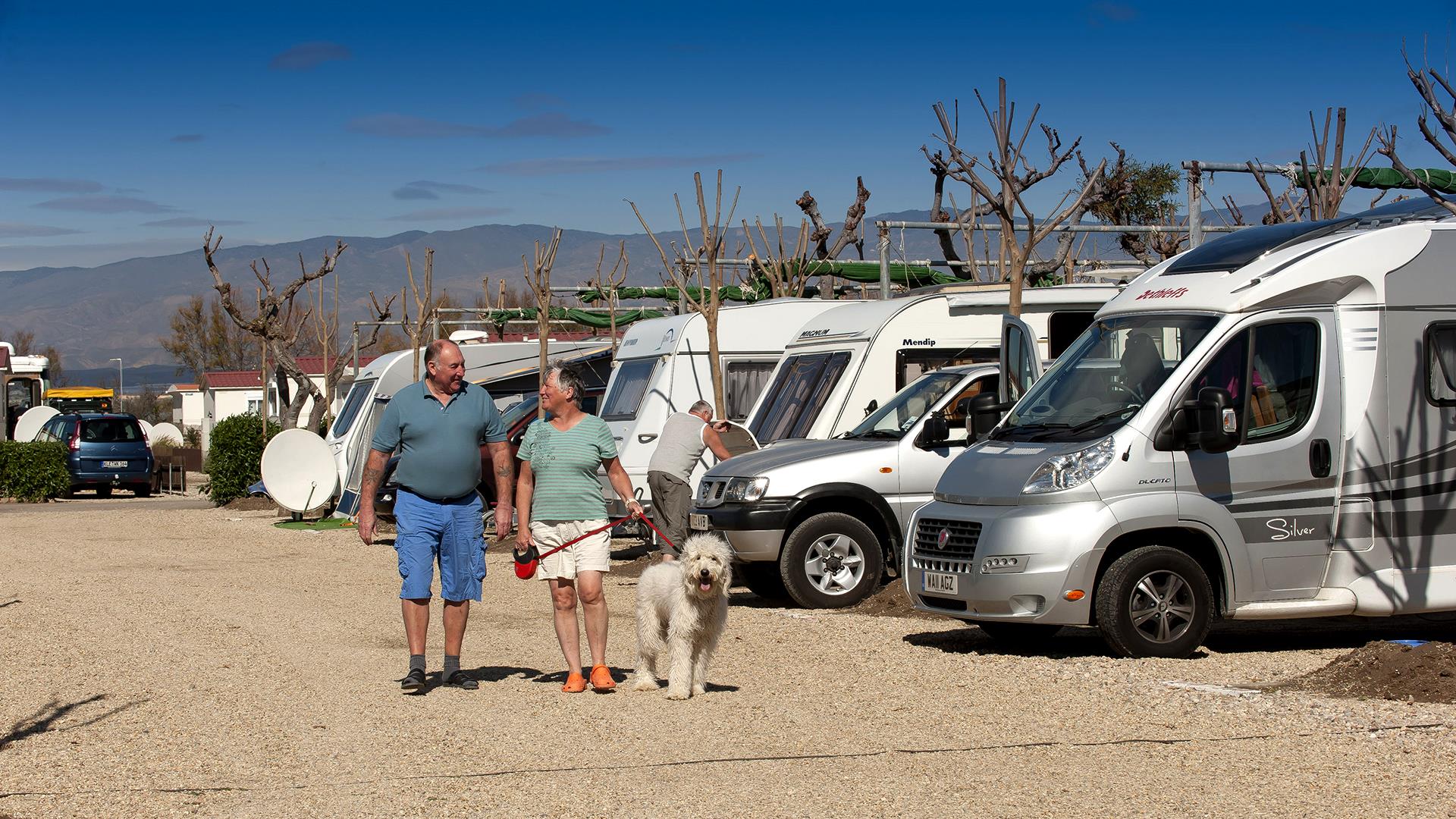
Pets are welcome on most overseas campsites but beware of the hot weather conditions
Visiting a vet prior to your return journey
Your pet must be inspected and treated by a vet up to five days before your return to the UK. Depending on your journey timing, you may be able to have your pet treated in your holiday location before departure, rather than near the port on the way home. On longer ferry routes, it may be a good idea to leave the vet visit until 24 hours before departure, in case of any last-minute changes to your ferry schedule.
Ask at your campsite for a recommended vet, look for vets on Eurotunnel or ferry company websites and in any town in the country you are visiting by searching for “Yellow Pages + the name of the area”. Most vets in France are open Monday-Saturday, but only for emergencies on Sundays.
Gas and electricity
Please check out our Expert Guide to Gas and Expert Guide to Electricity, which contain wide-ranging advice on the use of gas and electricity when camping, and include sections covering their use on the continent.
These guides are especially important as there are a variety of important factors to consider, not least laws regarding carrying gas on ferries and Eurotunnel, the types of gas (as well cylinders and regulators) available in Europe – and differences between countries – and the provision, connections and cost implications, of electricity supplies.
Carbon Monoxide
Remember the potential danger of CO (Carbon Monoxide) poisoning. Any combustion appliance (gas, petrol or charcoal) should be obtained from a reputable source, maintained properly and used in the manner for which it is designed.
The Club does not recommend the use of any combustion appliance in a tent or awning unless there is an area specifically designed for it and there is adequate ventilation. Never use any cooking device for heating your unit, they are not designed to do this. Always use a CO alarm for your own safety.
Bicycles and Ebikes
As more and more people take bicycles and electric bikes on their travels, it’s important to recognise differing rules and regulations that apply on the continent.
Cycling
Regardless of the country-by-country regulations, we advise that you always use front and rear lights and wear cycle helmets and high visibility clothing when cycling.
The requirements are generally the same as those for a new bike in the UK. These include the requirement to have:
• Reflectors on wheels, pedals and front and back
• Working lights, which must be used at night and when conditions dictate
• A working bell or similar
• A helmet must be worn by children under 12
Some specific country advice the Club is aware of:
Spain:
• Trailers must not be towed by a bicycle or tricycle
• Cyclists must ride in single file when visibility is poor
Portugal:
• Cyclists must wear a helmet when riding an electric bicycle
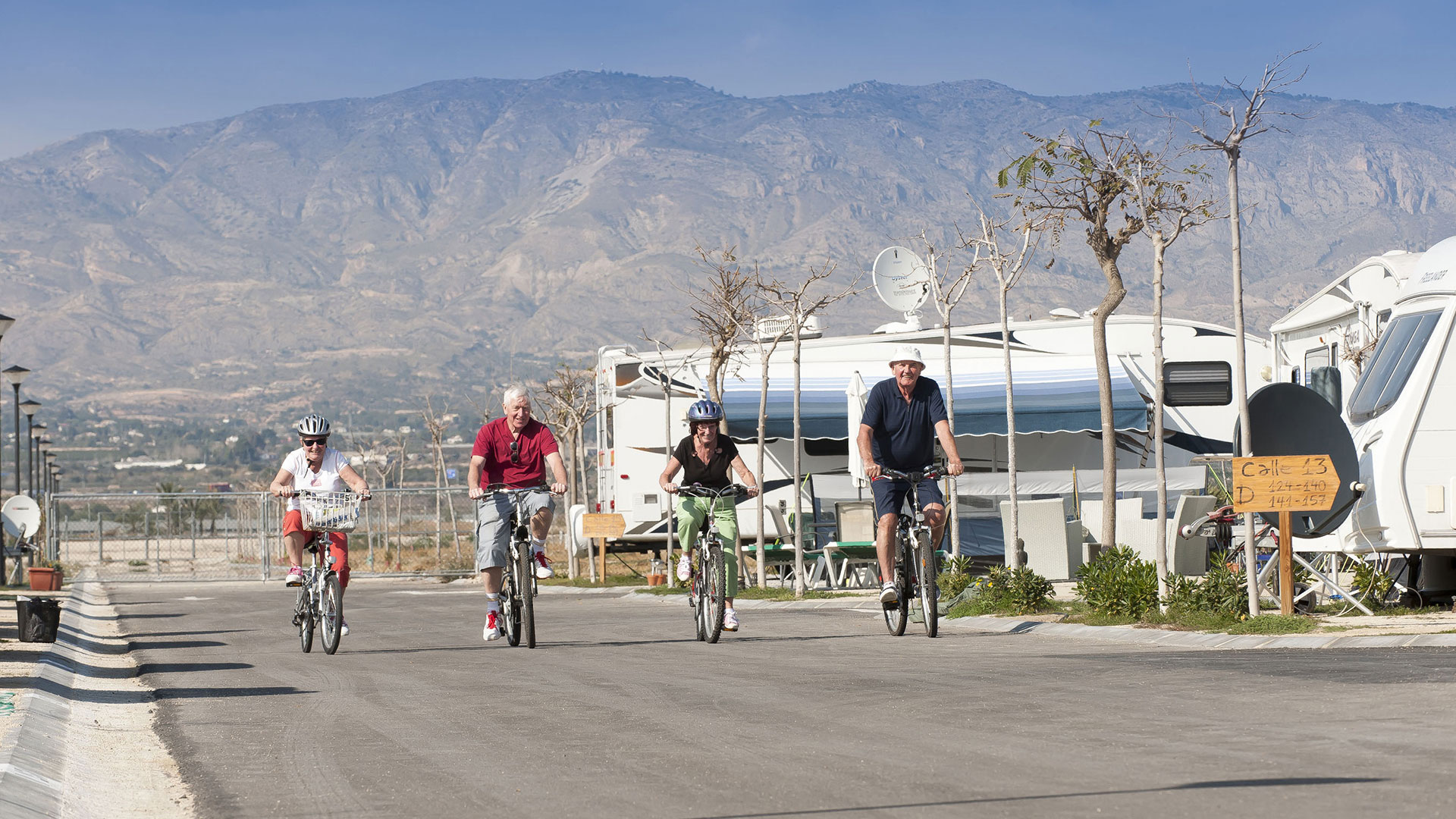
Cycling is a great way to explore the local area during a camping holiday but be aware of the rules of the country you are in
Electric bikes
The UK’s rules for Electrically Assisted Pedal Cycles (EAPCs) are available at gov.uk/electric-bike-rules, and largely mirror the ones that apply throughout mainland Europe. More powerful machines and those that can be powered without any pedalling are generally considered to be mopeds, E scooters or motorcycles, and require appropriate tax and insurance. A useful guide for Ebikes is available here.
We recommend that, if in any doubt about the legal position in a particular area, members should take advice from the campsite management team on arrival.
E scooter use in Mainland Europe
The rules in the UK apply to officially hired scooters only and may be significantly different across mainland Europe. We have pulled together some of the significant rules below.
• Not allowed on public roads and cycleways: Greece, Netherlands, Norway (use on private land with permission is allowed)
• Allowed on pavements: Belgium, Bulgaria, Estonia, Slovakia, Sweden
• Age restrictions: Austria (12), Denmark (15), Germany (14), France (12), Italy (18), Portugal (15), Slovakia (15), Czech Republic (18)
• Age that are helmets required up to: Czech Republic (18), France, Sweden (16)
• Speed limit: 15-20kmh
• Insurance required: Germany, France
Our recommendation is to wear a helmet (where legal) and make sure you have adequate insurance, since this activity might not be covered by normal travel policies.
Please note that rules governing the use of Ebikes and E scooters are constantly changing so we’d advise you carry out your own research to avoid breaking any local laws and check with campsite staff on arrival. A useful reference is the recommendations from the European Commission here.
